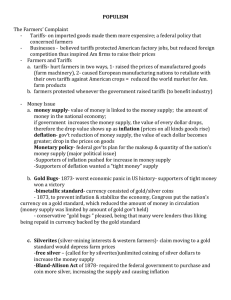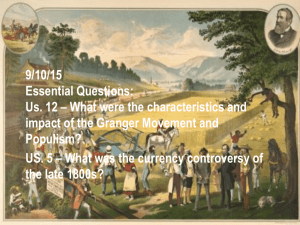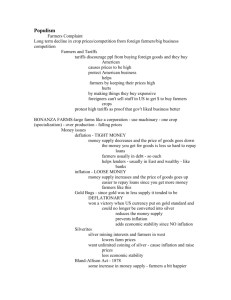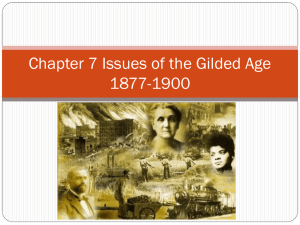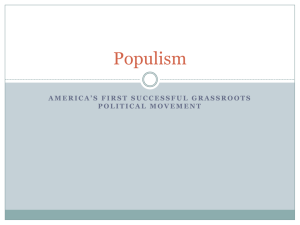Populism - Trimble County Schools
advertisement
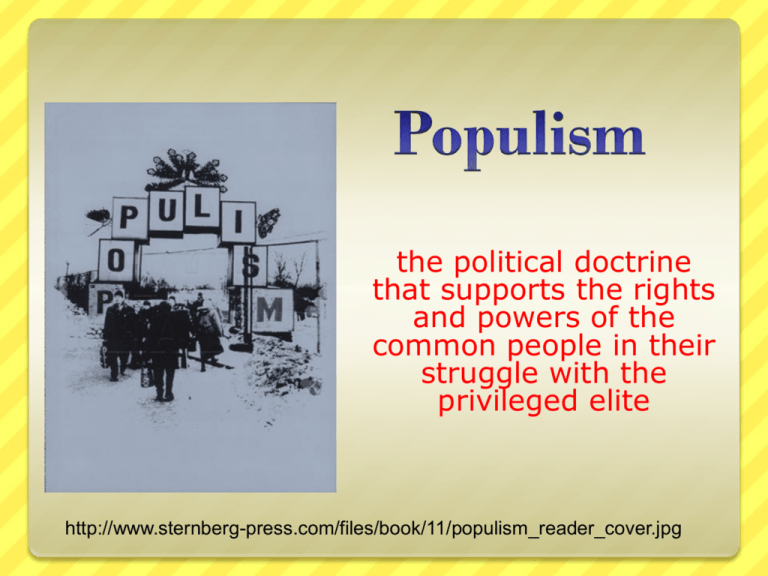
the political doctrine that supports the rights and powers of the common people in their struggle with the privileged elite http://www.sternberg-press.com/files/book/11/populism_reader_cover.jpg Bellringer: Why do merchants and service industries accept paper money or coins in return for goods and services? What gives these items value? Learning Targets: I Can… Describe farmers’ economic complaints during the late 1800s. List the key organizations formed to protest problems faced by farmers. Understand populism, the people behind the movement, and its legacy. Farmers and Tariffs Tariffs on imported goods discourage people from buying imports. Goods are more expensive. Industrialists claimed tariffs protected American factory jobs and their own profits Reduced foreign competition – encouraged American firms to raise prices – not good for workers Helped farmers by protecting against competition from farm imports Tarriff Hurt farmers by raising prices of manufactured goods and preventing foreigners from earning American currency to by U.S. crops Tariffs indirectly reduced the international market for American farm products Whenever government raised tariffs to benefit industry, farmers protested http://www.cartoonstock.com/newscartoons/cartoonists/rma/lowres/rman438l.jpg Money Issue If the government increases the money supply, the value of every dollar drops. This shows up as inflation. Borrowers benefitmoney they pay back is worth less than what they borrowed Inflation allows sellers to charge higher prices http://comps.fotosearch.com/comp/LIQ/LIQ102/bug-dancing-money_~vl0001b032.jpg If the government reduces the money supply deflation or a drop in the prices of goods occurs After the Civil War the money supply shrank = a prolonged period of deflation Monetary Policy – The federal government’s plan for the make-up and quantity of the nation’s money supply Gold Bugs U.S. bimetallic standard until 1873, both gold and silver 1873 Congress put U.S. on gold standard to prevent inflation and ensure economic stability This reduced the money supply, it would be limited by the amount of gold held by the government Silverites Called for free silver Unlimited coining of silver dollars as a means of increasing the money supply Brand-Allison Act – required the federal government to purchase and coin more silver, increasing the money supply and increasing inflation Passed by Congress Vetoed by President Hayes Congress overrode the veto Limited effect bought only minimum/refused to circulate (Treasury) Sherman Silver Purchase Act 1890 increase the amount of silver the government was required to buy per month Notes could be turned in for silver or gold Gold supply began to deplete so President Cleveland repealed the act in 1893 Farmer Protest The Grange – patrons of husbandry 1866 founded by Oliver H. Kelley Formed cooperatives Pressured state legislatures to regulate businesses farmers depend on (railroad, etc.) Farmers Alliances 1880s Launched attacks on monopolies Emphasized federal regulation of railroads More money in circulation Creation of state departments of agriculture Anti-trust laws/farm credit Women held offices Mary Elizabeth Lease – popular speaker, Kansas Lawyer - raise “less corn and more hell!” “Colored Farmers Alliance” Inactive Government 1880-1892 no candidate won a majority of popular vote President protected American Industry due to their promises of support Cleveland did sign Interstate Commerce Act of 1887 - Regulated the prices that railroads charged to move freight between states requiring rates to be set in proportion to the distance traveled illegal to give special rates to some customers set up Interstate Commerce Commission (ICC) to enforce laws 1890 President Harrison passed Sherman Anti-trust Act Populists called for increased circulation of money urged unlimited minting of silver supported a progressive income tax (% of taxes owed increase w/income) Government ownership of communication/transportation systems Endorsed 8 hour work day (to attract urban support) Opposed use of Pinkertons to reach out to African American and white farmers 1892 election President Cleveland reelected – he then alienated labor - put down Pullman Strike/ angered farmers by supporting gold standard Bryan’s “Cross of Gold” 1896 election Republican William McKinley was for the Gold Standard and ran a traditional campaign giving front porch speeches from home in Ohio. Populists and Democrats William Jennings Bryan was a silverite and ran an active campaign. He gave a moving speech criticizing the Cross of Gold. Bryan lost. He did not carry urban industrialist. Legacy More gold strikes raised world supply Congress put U.S. back on gold standard Crop prices began a slow raise until 1920 Silver movement and populism died Progressives later applied populists ideas to urban and industrial problems Exit Slip: 1. 2. 3. 4. 5. Describe farmers’ economic complaints during the late 1800s. List the key organizations formed to protest problems faced by farmers. Summarize Populism, the people behind the movement, its promises, and its legacy. Why were Americans divided over the issue of tariffs at this time? Why did industrialist profit from them and farmers protest them? What other times in history has this been an issue? Populism appealed to people in many parts of the country. How can you explain, then, the failure of the Populist party to win the presidential election of 1896?
